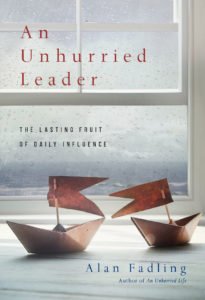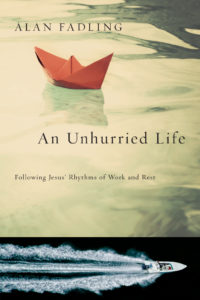In working on Write Better (due out October 2019), I asked some other authors about their experiences with writer’s block, especially one unexpected form. Having written one book, authors often find major hurdles in finishing a second, especially if the first was successful. I call this Second-Book Syndrome. I couldn’t fit all of Alan Fadling’s helpful comments in the book, so here, with his permission, is more of what he told me.
I really did wrestle with my second book, An Unhurried Leader. Some of the dynamics were probably unique to me, and some are, I’m sure, common to many, such as a major vocational transition.
 I also had to deal with the unexpected success of the first book, An Unhurried Life. Where I could have simply been grateful and encouraged by a CT book award (which I was, actually), I also let it become a point of fear and anxiety: “How in the world do I top my first effort? How can my second book be anything but a disappointment to readers of the first?”
I also had to deal with the unexpected success of the first book, An Unhurried Life. Where I could have simply been grateful and encouraged by a CT book award (which I was, actually), I also let it become a point of fear and anxiety: “How in the world do I top my first effort? How can my second book be anything but a disappointment to readers of the first?”
I overcame this by deciding that my goal was not to top my first effort, but simply to share some important insights that had meant a lot to me. It helped me to think that writing this second book was something I wanted, and maybe even needed to do. Instead of focusing on the imagined response of future readers, I focused on sharing my stories, my insights, my experiences, trusting that they would be helpful to those future readers.
I also dealt some of the resistances I felt writing book one and feel now writing book three with my wife. I shared the paragraph below with a friend who is an aspiring writer.
 “My reasons for not writing are legion. I don’t feel like it. I don’t have anything to say right now. What I have to say won’t help anyone. I don’t have a good focus for my writing. I’m in too busy a season to write. I’m in too noisy a place to write. There is too much to write, so I don’t know where to start writing. No one will want to read what I’m writing. No one will want to publish what I’m writing. Ad infinitum.”
“My reasons for not writing are legion. I don’t feel like it. I don’t have anything to say right now. What I have to say won’t help anyone. I don’t have a good focus for my writing. I’m in too busy a season to write. I’m in too noisy a place to write. There is too much to write, so I don’t know where to start writing. No one will want to read what I’m writing. No one will want to publish what I’m writing. Ad infinitum.”
Fear. Anxiety. Self-doubt. Insecurity. Perfectionism. All of these are resistances I often have to press through to write.
The last thing I’ll say is that I find a lot of help in Dallas Willard’s encouragement to release outcomes to God. It is my attachment to outcomes, imagined as amazing or imagined as dire, that gets in my way a lot. Usually, getting unstuck ends up being a matter of being in the present moment, being in the Presence, and being focused on the present task of actually writing.
Alan Fadling
